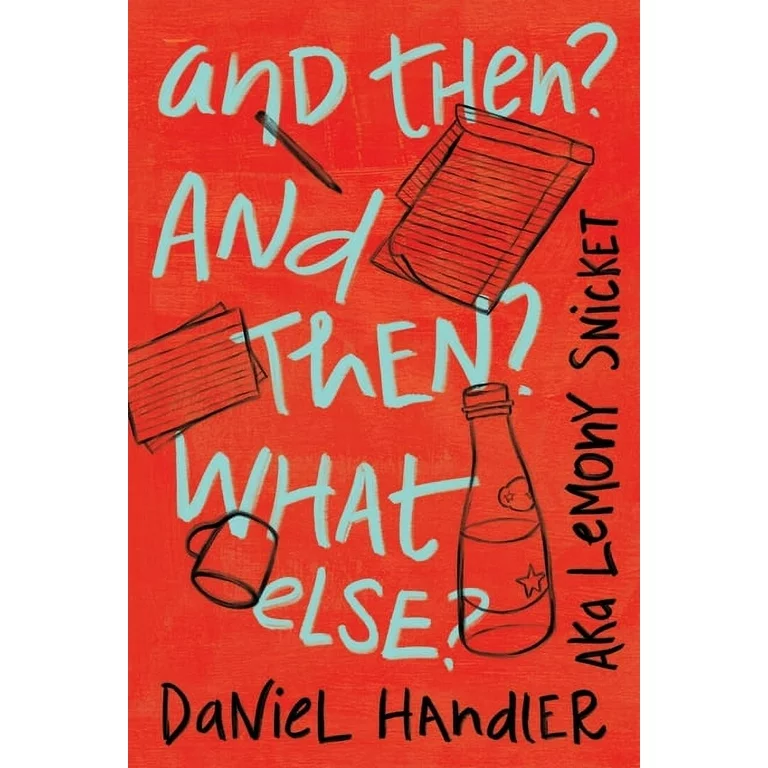
I have never written a book review before, let alone for an author that I have admired for a decade. This is the thought that ran through my head when reading And Then? And Then? What Else?, Daniel Handler’s latest book of essays. It feels wrong somehow, for me to be critiquing a book written by someone whose work I have leeched off of to fuel my own creative endeavors. (In fifth grade, I wrote a story that unfortunately parallels The Wide Window nearly beat-for-beat.)
When I was 10 years old, I stood in line at a Barnes & Noble in El Cerrito to get my book signed by Lemony Snicket. Instead of Mr. Snicket, Mr. Handler was subbing in that day, and though it took me half the event to understand that the two men were the same people, I was still entranced by the prospect of getting to ask a real-life author about his books.
Sadly, I was incredibly shy about talking to adults, particularly men, so I let the brave boy in front of me ask a question instead: “What happened to the Quagmire triplets?” Handler replied by telling him matter-of-factly that it was all in the books.
It was all in the books. For the next decade, I read and re-read the books trying to understand. What happened to the Quagmire triplets? What happened to the hook-handed man and Fiona? What about the giant pulsing question mark in the middle of the ocean? And most importantly, what was in the sugar bowl?
I read and re-read until I wasn’t sure whether the events that ensued at the Barnes & Noble even occurred. Was I making them up? Was there even a Barnes & Noble in El Cerrito? Was I ever in fifth grade? None of my questions were answered.
Many will read this new book in search of closure, like I did, only to find that we were – surprise! – wrong. There is no closure. There are no straight answers.
However, if there is anything one can learn from Handler, it is to embrace wrongness and enjoy incongruence. Handler addresses this directly in And Then? And Then? What Else?, recounting his son confusing parking citations with admission tickets into zoos, movie theaters, and amusement parks. Handler, being a good father, corrected his son. At the end of the essay, Handler professes his desire to cherish that moment of clarity, writing that “it’s a ticket, being wrong, not only a citation…”
Much of Handler’s newest book can be described as such – a citation (wrong!) and a ticket into a chocolate factory. The only way to receive a citation is to break the rules a little bit, just enough that you don’t get carted off to jail, and Handler certainly does so with And Then? And Then? What Else? He toes the line and pushes the envelope. He talks about sex, paranoia, and a psych ward. He makes fun of babies! All things that angry suburban mothers would rope off from children’s eyes and, therefore, all the more important for a children’s author to write about. Handler uses these banned items to explore themes of radical acceptance and desire, both sexual and also the desire that fuels readers’ search for answers.
This longing pervades the entirety of Handler’s book, from discussions of the loneliness of reading to the drama of singing “You said– you’d be– my girlfriend!” And Then? And Then? What Else? feels less like traditional classroom reading, and more like an epic quest through time and space, led by a Gandalf-like figure named Daniel. Instead of carrying a ring of power, Handler’s readers are driven by desperate attempts to understand the world. And then? And then? What else?
Much of this book feels like a confession. Not because all of the details are 100% fact-checked – in fact, Handler confides that they’re not – but because it is clear that this is someone who has used every bit of his life to feed and inform his stories. His candor resonates with readers. It doesn’t matter that Handler makes things up – what matters is that he is being truthful about why.
Handler reminds the reader that you are allowed to reshape and fabricate life, the same way Lemony Snicket is a made-up name and the same way that his story about his parents' first meeting in an opera box – spoiler alert – is also made-up. In one essay, amidst a funny story about a wedding in wine country, he urges us to find these blanks and fill them out ourselves, whether they’re right-wing questionnaires or empty index cards or details about a secret society called VFD.
Handler will never tell us what’s in the sugar bowl or whether Carmelita Spats got her comeuppance because that’s for us, readers, to continue turning over in our heads, like a slight you can’t forgive. You must accept the uncertainty, the way Handler describes accepting his sleep paralysis nightmares in And Then? And Then? What Else? – nothing is “real”. That, in itself, is freeing. It’s much more fun to stumble against the blanks that Handler sets out like little rat traps, being wrong and wronger, knowing that, as Handler puts it, we can always find more to love.
